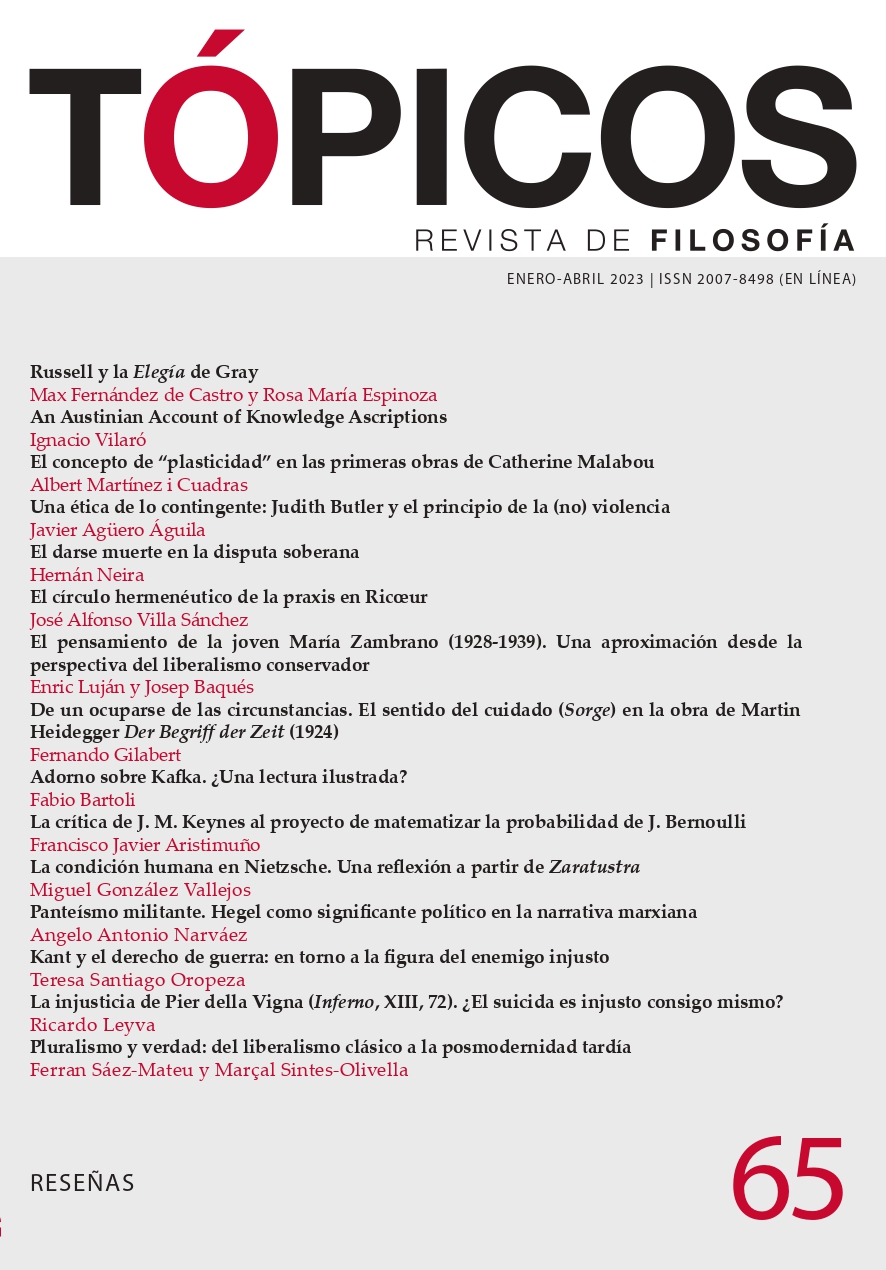Publicado 2022-12-02
Palabras clave
- Heidegger,
- cuidado (Sorge),
- ser-en-el-mundo (In-der-Welt-sein),
- ser-con (Mit-sein),
- el Uno (das Man)
Derechos de autor 2022 Tópicos, Revista de Filosofía

Esta obra está bajo una licencia internacional Creative Commons Atribución-NoComercial-SinDerivadas 4.0.
Cómo citar
Resumen
El existenciario del cuidado (Sorge) es uno de los elementos de mayor importancia en el entramado filosófico de Martin Heidegger. El cometido de mi trabajo es profundizar en la relación que tiene ese existenciario con otros tres que consideramos fundamentales: ser-en-el-mundo (In-der-Welt-sein), ser-con (Mit-sein) y el Uno impersonal (das Man). Una panorámica propedéutica de la relación con ellos puede elucidarse a partir de la conferencia que Heidegger impartió en Marburgo en 1924: Der Begriff der Zeit, uno de los textos clave de los que allanan el camino a Sein und Zeit, considerada su obra magna.
Referencias
- Escudero, J. A. (2009). El lenguaje de Heidegger. Diccionario filosófico 1912-1927. Herder.
- Gilabert, F. (2020). Propedéutica existenciaria de la vida en común a partir del pensamiento de Martin Heidegger. Condiciones de posibilidad de una política de mínimos. [Tesis doctoral]. Universidad de Sevilla. URL: https://hdl.handle.net/11441/93468.
- Heidegger, M. (1985). Gesamtausgabe. I. Abteilung: Veröffentlichte Schriften 1910–1976. Band 12. Unterwegs zur Sprache (1950–1959). Vittorio Klostermann.
- Heidegger, M. (1995a). Gesamtausgabe. II. Abteilung: Vorlesungen 1919–1944. Band 60 Phänomenologie des religiösen Lebens. Vittorio Klostermann.
- Heidegger, M. (1995b). Gesamtausgabe. II. Abteilung: Vorlesungen 1919–1944. Band 63. Ontologie. Hermeneutik der Faktizität. Vittorio Klostermann.
- Heidegger, M. (2004). Gesamtausgabe. III. Abteilung: Unveröffentlichte Abhandlungen. Vorträge – Gedachtes. Band 64. Der Begriff der Zeit. Vittorio Klostermann.
- Heidegger, M. (2006). Sein und Zeit. Niemeyer.
- Heidegger, M. (2009). Ser y tiempo. J. E. Rivera (trad.). Trotta.
- Heidegger, M. (2011). El concepto de tiempo. R. Gabás y J. Adrián (trads.). Trotta.
- Pöggeler, O. (1983). Der Denkweg Martin Heideggers. Neske.
- Real Academia Española. (2014). Estar. En Diccionario de lengua española. [DRAE]. Espasa.
- Safranski, R. (2007). Un maestro de Alemania. Martin Heidegger y su tiempo.
- R. Gabás Pallás (trad.). Tusquets.
- Sartre, J.-P. (1996). L’existentialisme est un humanisme. Gallimard.
- Schopenhauer, A. (1986). Die Welt als Wille und Vorstellung. Suhrkamp.





